Understanding Body Storage Refrigeration: Dignity and Preservation
A body storage refrigerator is specialized equipment designed to preserve human remains by maintaining optimal temperature conditions that slow decomposition while ensuring dignity for the deceased. For funeral directors seeking immediate information:
| Body Storage Refrigerator Basics | Details |
|---|---|
| Standard Temperature Range | 1°C to 5°C (34°F to 41°F) |
| Capacity Options | Single body to 50+ bodies |
| Main Types | Walk-in coolers, body boxes, upright units |
| Average Preservation Time | 3-14 days at standard temperature |
| Price Range | $1,300 (single unit) to $32,000+ (multi-body) |
When selecting a mortuary refrigeration solution, funeral directors must balance capacity needs, space constraints, energy efficiency, and budget considerations. The right unit ensures proper preservation while supporting dignified end-of-life care.
Modern body storage refrigerators feature stainless steel construction, PUF insulation, digital temperature controls, and alarm systems to maintain ideal preservation conditions.
I'm Mortuary Cooler, a national-level supplier of mortuary refrigeration systems with extensive experience helping funeral homes select and implement the right body storage refrigerator solutions for their specific needs.
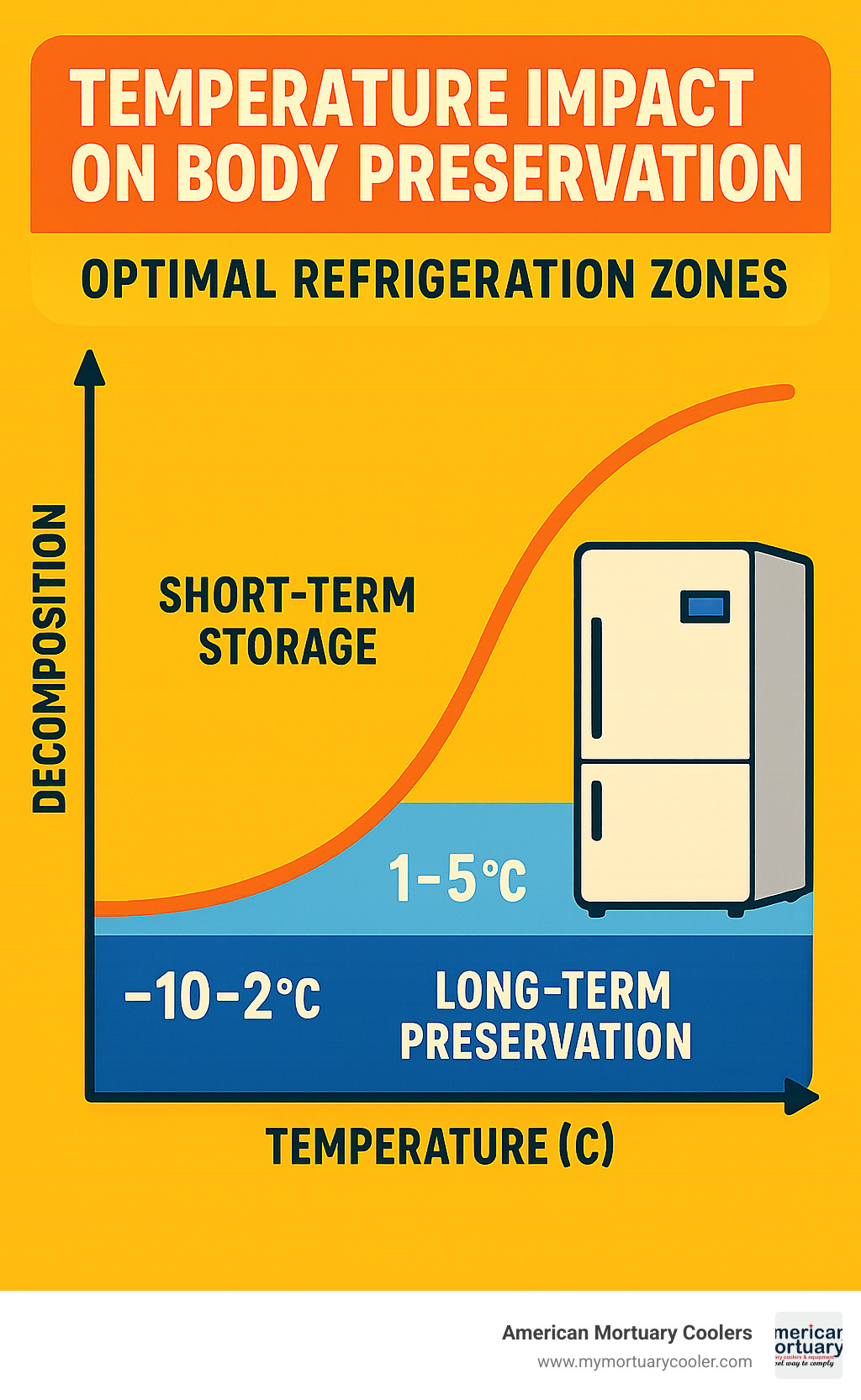
Body storage refrigerator glossary:
How a Body Storage Refrigerator Works
When families trust us with their loved ones, they're counting on reliable preservation technology. A body storage refrigerator operates through a continuous refrigeration cycle: the compressor compresses refrigerant gas, increasing temperature and pressure; the condenser releases heat outside; the expansion valve drops pressure to cool the refrigerant; and the evaporator absorbs heat from inside the unit, cooling the interior.
At American Mortuary Coolers, we use medical-grade stainless steel 304 for both interior and exterior surfaces, ensuring corrosion resistance and easy sanitization. Our polyurethane foam (PUF) insulation provides exceptional temperature stability while keeping energy costs down. Details like vapor-proof lighting and magnetic door gaskets create perfect seals to maintain temperature and prevent odor escape.
Our digital controllers maintain temperatures within ±0.1°C of the set point, with high/low temperature alarms to alert staff of issues. Many facilities appreciate our optional data logging capabilities for regulatory compliance, and our redundant systems ensure operation continues even if primary controls fail.
Positive vs. Negative Temperature Body Storage Refrigerator
Positive temperature units (2-4°C or 35.6-39.2°F) are standard for most funeral homes. These units slow decomposition without freezing tissues, preserving natural appearance for viewings and services. They're ideal for the typical 1-2 week timeframe most funeral homes need and consume less energy than freezers.
Negative temperature units (-10°C to -50°C or 14°F to -58°F) are specialized freezers that nearly halt decomposition entirely. These are primarily used in forensic settings, medical examiner offices, or situations requiring long-term preservation. While effective for extended storage, these units require defrosting cycles, use more energy, and may cause tissue changes affecting viewability.
Not sure which temperature range is right for your facility? You can explore our refrigeration system guide for more detailed information.
Single vs. Multi-Body Storage Refrigerator Units
Single-body units offer flexibility for smaller facilities or those with limited space. These compact refrigerators have a smaller footprint, require less initial investment, and allow you to add capacity incrementally. They typically work with standard electrical systems, making installation straightforward.
Multi-body units shine in busier facilities handling higher case volumes. These larger systems provide economy of scale, with each chamber typically supporting a load capacity of about 150kg. Many models feature independent chambers with individual temperature controls, allowing customization for different preservation needs.
One valuable feature of our multi-chamber units is operational redundancy. If one refrigeration system experiences issues, the other chambers remain functional – preventing a total loss of refrigeration capacity during critical periods.
Types, Sizes, and Capacities
When it comes to body storage refrigerators, one size doesn't fit all. American Mortuary Coolers offers various configurations to match your specific requirements.
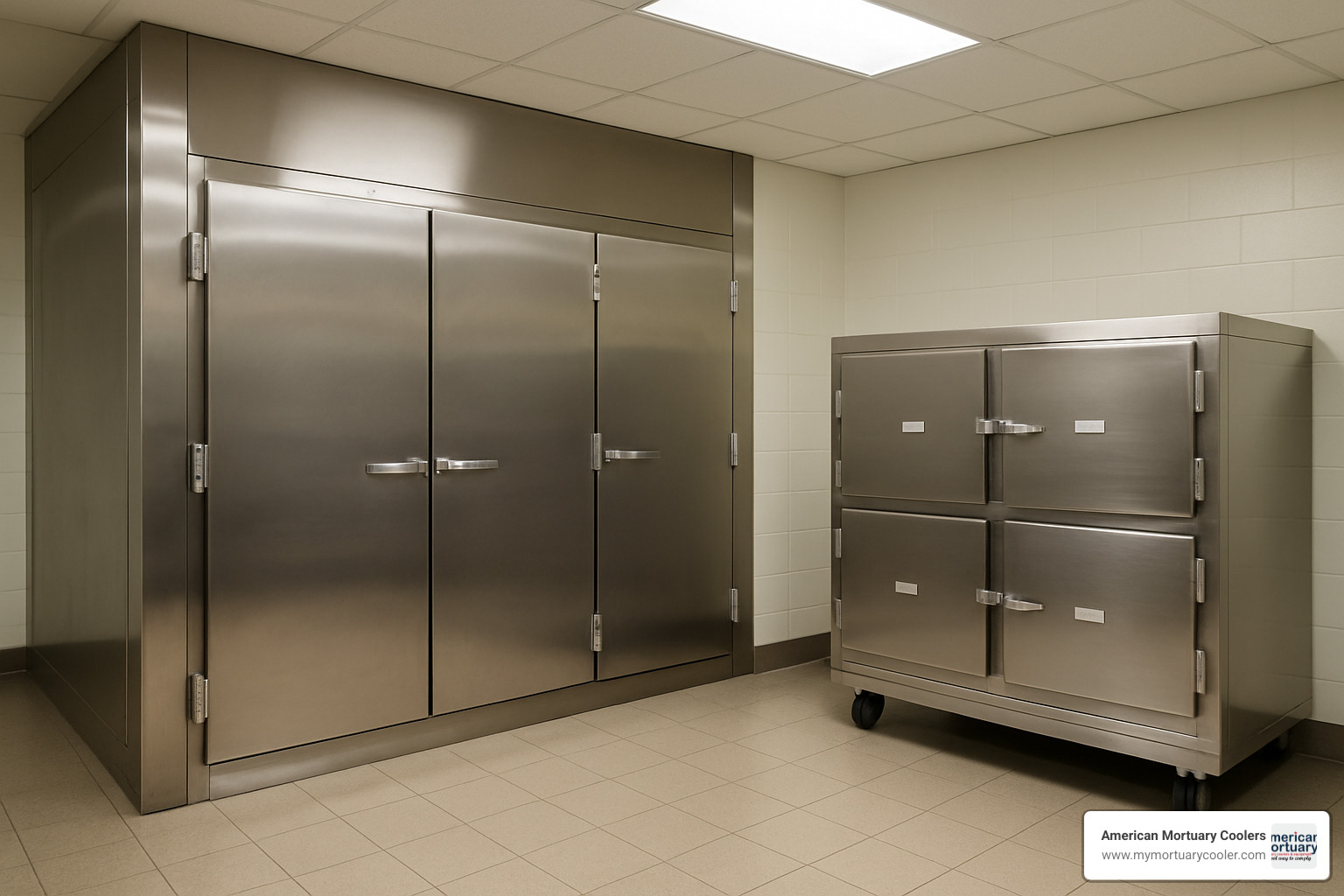
Walk-In Coolers
Walk-in coolers are the workhorses of mortuary refrigeration. These room-sized units offer tremendous flexibility with capacity ranging from 4 to 50 bodies. Built with modular insulated panels (typically 4 inches thick) and featuring durable stainless steel interiors, they can be equipped with adjustable cantilever racks or complete mortuary rack systems to maximize storage efficiency.
They're perfect for larger funeral homes, hospitals, medical examiner offices, or disaster response situations where capacity needs can change rapidly.
Body Box Refrigerators
For smaller facilities or those needing supplemental storage, body box refrigerators offer practical solutions with a smaller footprint. These standalone cabinets hold between 1-15 bodies depending on the model and come in several configurations:
Upright models provide vertical storage in a compact footprint. Roll-in units allow you to transfer remains on carts directly into the unit. Side-loading configurations work well in spaces with limited depth, while telescoping rail models feature rails that extend outward for easier access during transfers.
We also offer extra-wide dimensions for bariatric needs. Body boxes generally require a lower initial investment than walk-ins, making them ideal for small to medium funeral homes or as overflow capacity.
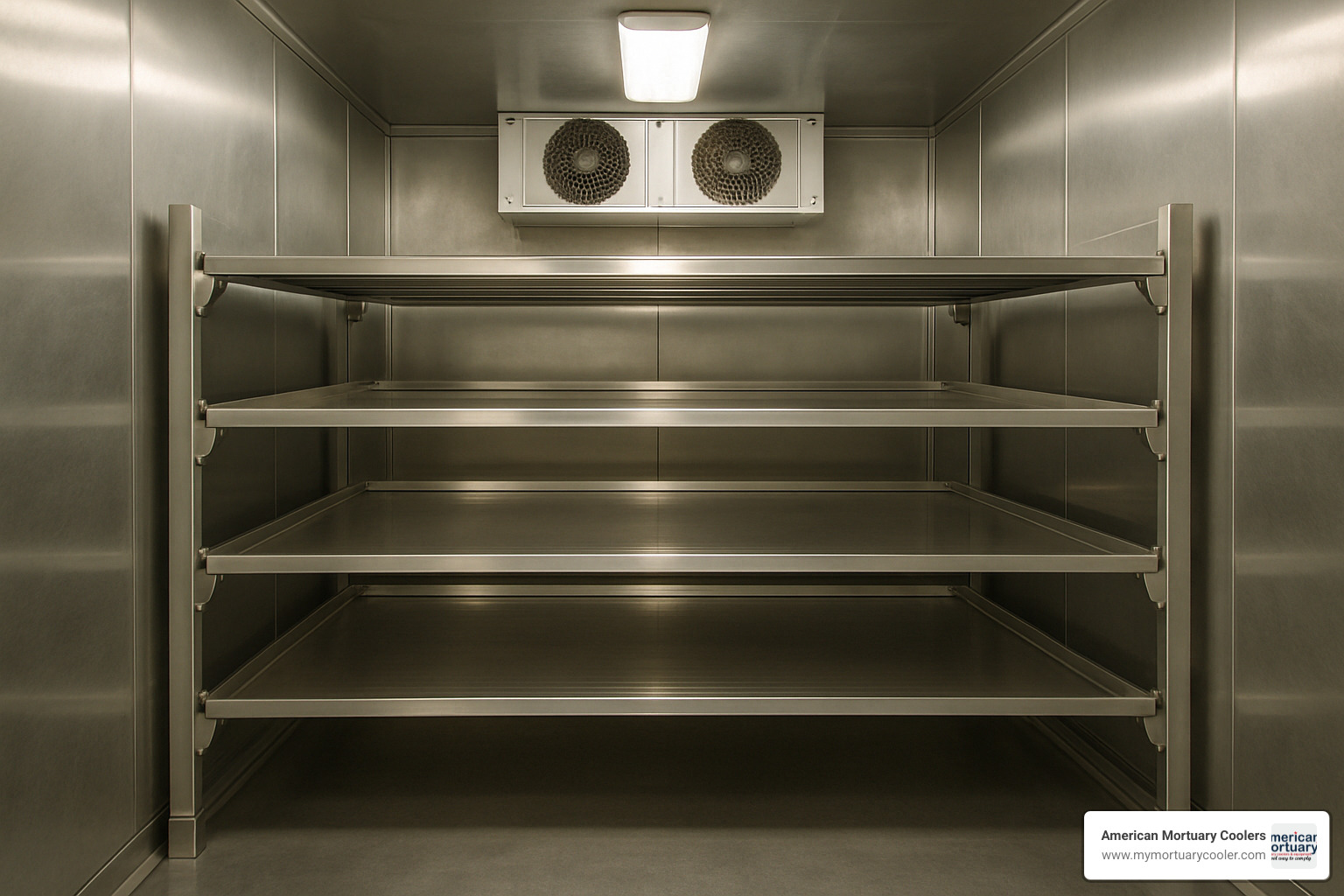
Selecting the Right Capacity for Your Facility
Choosing the appropriate capacity isn't just about current needs—it's about planning for your future. Analyze your current case volume and peak periods carefully. Consider seasonal variations and community growth projections.
A good rule of thumb: plan for capacity that's at least 1.5 times your average weekly case volume. This buffer ensures you're prepared for unexpected surges.
Don't forget practical considerations like available floor space and doorway clearances. We've helped many clients develop creative solutions for challenging spaces, including custom-dimensioned units.
For more detailed guidance, our guide on effective mortuary cooler features provides in-depth analysis tools.
Modular & Customizable Options
Our modular systems use prefabricated panels that can be easily assembled, disassembled, and relocated as your needs evolve. This approach means your investment grows with you.
Our adjustable cantilever racks maximize storage density while maintaining easy access. For facilities anticipating growth, we design systems with expansion capability built in from the start.
For outdoor installations, we offer specialized weatherproofing options including protective coatings and condensing unit covers. And because existing spaces often present challenges, we specialize in custom dimensions that work with your facility's unique layout.
Key Features & Buying Considerations
When investing in a body storage refrigerator, certain features can make all the difference in your daily operations.
Essential Features
Today's body storage refrigerators include digital temperature controllers that maintain precision within 0.1°C - because when it comes to preservation, even small temperature fluctuations matter.
Safety features include OSHA-compliant safety release handles that prevent accidental entrapment. Our vapor-proof LED lighting systems illuminate the interior clearly while being energy-efficient and safe for refrigerated environments.
Magnetic door gaskets create truly airtight seals that maintain temperature and prevent odor escape. We design our units with easy-clean features like coved corners and seamless surfaces because sanitation isn't just about compliance - it's about dignity and respect.
Construction Quality
We use medical-grade stainless steel 304 throughout our units because it resists corrosion even with frequent disinfection. Our 4-inch high-density insulated panels are specifically engineered for optimal thermal efficiency.
We maintain strict no-wood construction standards since wood absorbs moisture and can harbor bacteria. Even the hardware makes a difference: our commercial-grade hinges, latches, and handles are designed for frequent use.
Heated door frames prevent condensation and seal freezing - a feature you might not think about until you've dealt with a frozen door seal at the worst possible moment.
Energy Efficiency
Energy costs add up quickly with refrigeration equipment. High R-value insulation significantly reduces energy consumption over the life of your unit.
Door closure alarms prevent those "oops" moments when a door isn't fully closed - saving energy and preventing temperature fluctuations. Many models feature variable speed compressors that intelligently adjust output based on actual cooling demand.
When available, we offer Energy Star compliant units that meet strict efficiency guidelines. These investments typically pay for themselves through lower utility bills over time.
Regulatory Compliance
Our units comply with the Federal Energy Independence & Security Act (EISA 2007) requirements and undergo ASTM E84 testing for flame and smoke spread standards.
We ensure UL-NSF approval for safety and sanitation certification and meet OSHA requirements for workplace safety. Local health codes vary by jurisdiction - we can help you understand what applies in your area.
For a deeper dive into features across different models, our essential guide to body refrigerators provides comprehensive comparisons.
Advantages of Independent Refrigeration per Chamber
One feature worth special attention in multi-body units is independent refrigeration systems for each chamber. If one system encounters problems, your other chambers remain functional - preventing a total disaster during busy periods.
This design also allows selective operation. Need only two chambers this week? You can use just what you need, reducing energy consumption. The compressors cycle less frequently under partial loads, which means less noise in your facility.
Complementary Equipment & Supplies
Your body storage refrigerator works best as part of a complete system. Body lifts protect your staff from injury while improving efficiency. Quality storage trays make cleaning easier and transport smoother.
Don't overlook basics like appropriate body bags in various sizes, personal protective equipment, and threshold bridges that facilitate smooth transfers.
Installation, Maintenance & Safety
Proper installation, maintenance, and safety protocols ensure your equipment serves you reliably for years while protecting both your staff and the dignity of those in your care.
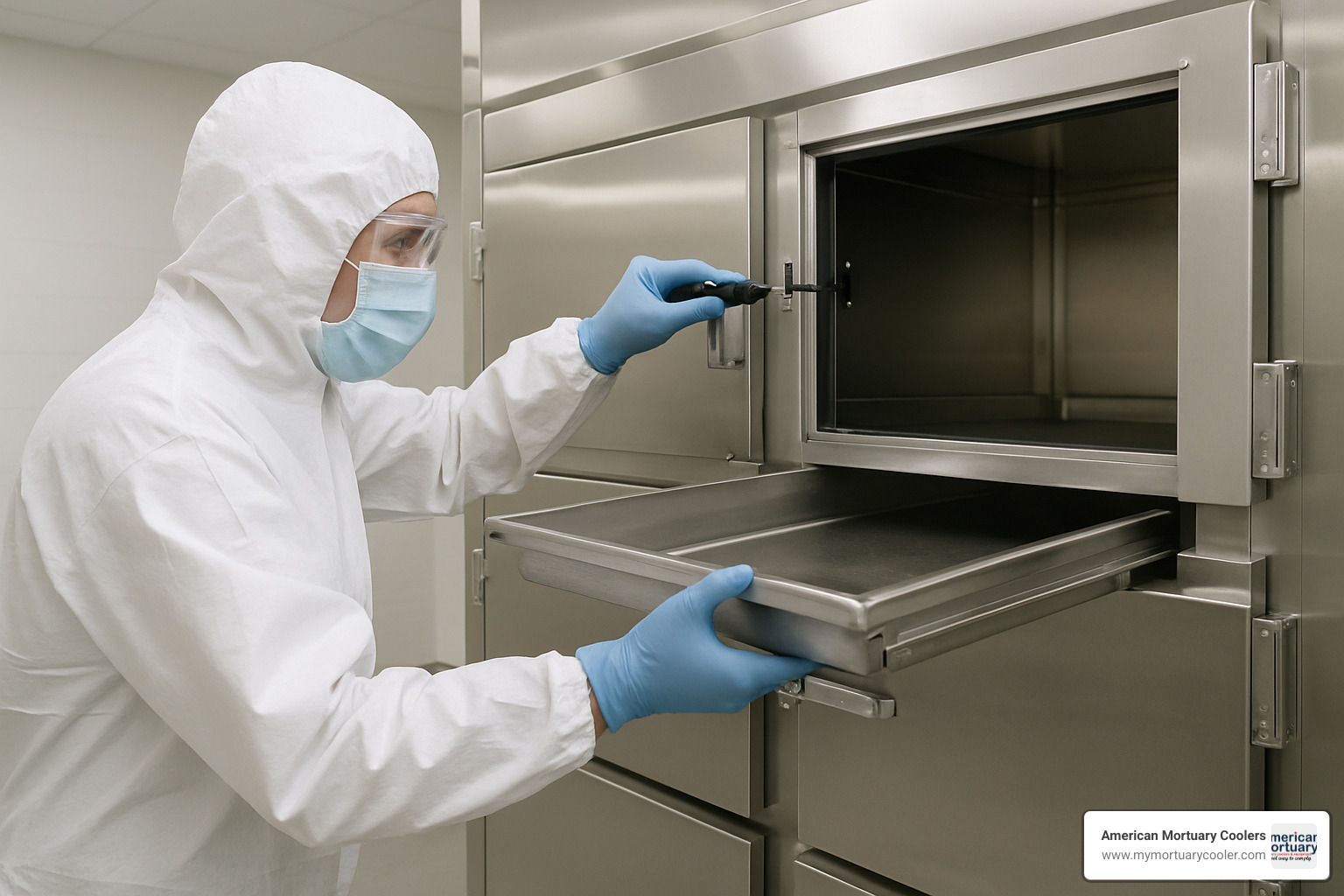
Installation Considerations
Before your new body storage refrigerator arrives, ensure you have a level floor that can support the unit's weight. Smaller units typically need 115V/60Hz/1Ph circuits, while larger units require 208-230V/60Hz/1Ph power.
Your unit needs adequate clearance for ventilation, door swing, and service access. Good ventilation prevents overheating, while proper floor drains make cleaning and condensate removal easier in walk-in units. Double-check that your doorways can accommodate the unit's dimensions.
Our team will walk you through a comprehensive site assessment before installation day to solve potential problems early.
Routine Maintenance Checklist
Regular maintenance prevents breakdowns at the worst possible times. A simple routine can dramatically extend equipment life and prevent emergency service calls.
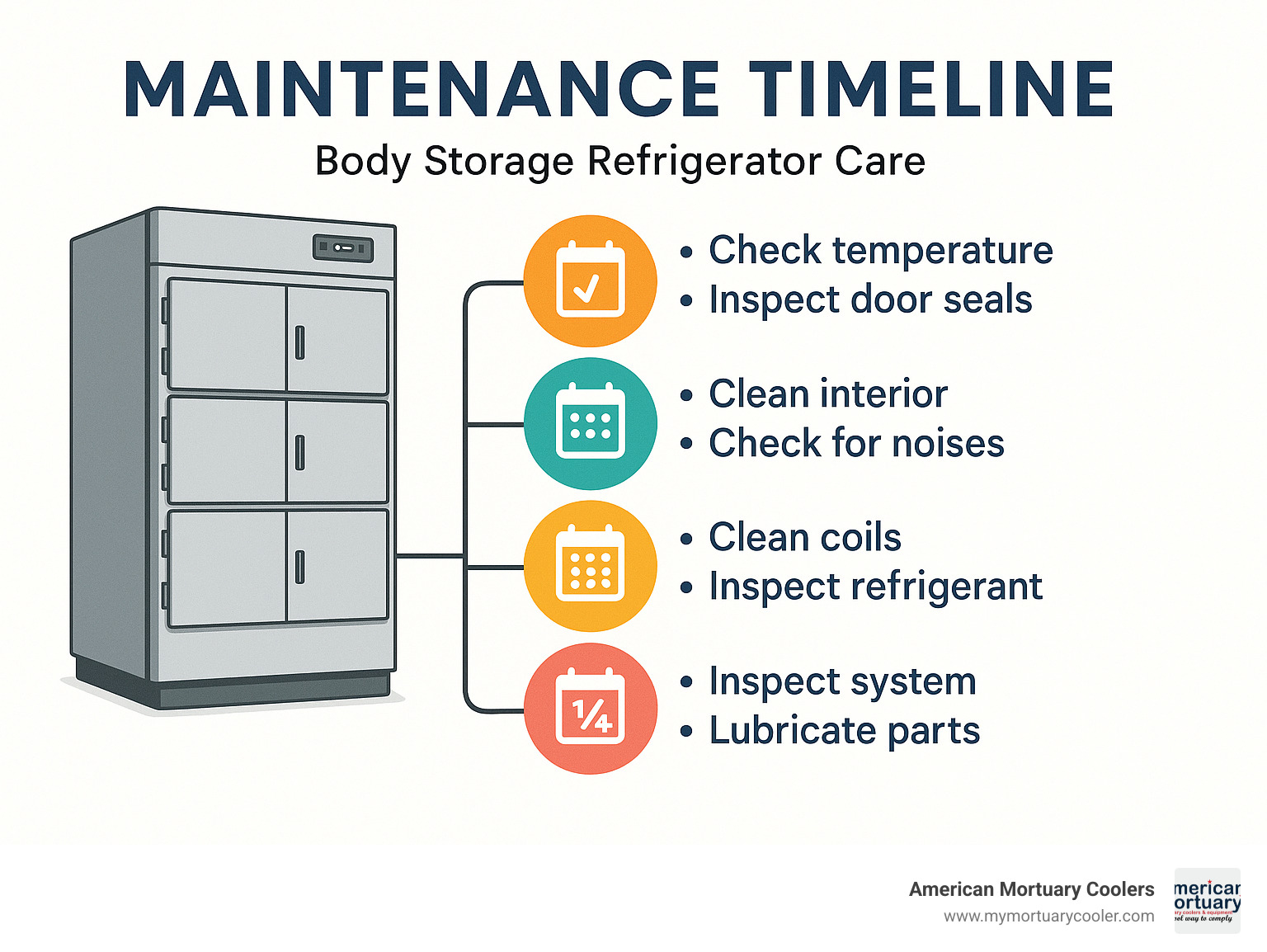
Daily attention: Check and record temperatures, inspect door seals, and wipe down exterior surfaces with appropriate disinfectants.
Weekly care: Clean interior surfaces (when empty) and listen for unusual noises that might signal developing issues.
Monthly maintenance: Clean condenser coils, check refrigerant levels by looking for frost patterns, and inspect door hardware for loose hinges or handles.
Quarterly service: Have professionals inspect the refrigeration system, lubricate moving parts, and calibrate temperature controls.
Annual maintenance: Schedule a complete evaluation by a certified technician to check refrigerant levels, replace worn gaskets, and verify electrical safety.
Safety & Regulatory Compliance
Operating a body storage refrigerator comes with important responsibilities. CDC guidelines provide essential direction for handling human remains safely, while OSHA requirements ensure proper lifting procedures and safety release mechanisms.
The equipment should meet specific standards – NSF certification for sanitary components and UL listing for electrical safety. Develop a relationship with your local health department for guidance specific to your area.
Maintain temperature logs and service records diligently. In the rare event of a problem, these records demonstrate your commitment to proper procedures.
Bereavement Care Considerations
Beyond technical aspects, your body storage refrigerator serves a deeply human purpose. Proper preservation maintains the dignity of the deceased while providing families the time they need to gather, sometimes from across the country or world.
The right cooling environment preserves viewable condition for services, giving families that important opportunity for goodbye. A well-designed refrigeration system accommodates varied religious and cultural traditions with adjustable temperature zones and appropriate storage configurations.
Pricing, Innovations & Market Snapshot
Let's talk dollars and cents – because that's often what funeral directors are most concerned about when considering a new body storage refrigerator.
Price Range and Factors
Body storage refrigerators come in a wide range of options:
- Single-body units: $1,300 to $6,000
- 2-4 body cabinets: $6,000 to $15,000
- 6-8 body cabinets: $15,000 to $32,000
- Walk-in coolers: $20,000 to $50,000+
What drives these price differences? The quality of stainless steel makes a significant difference in durability. Advanced control systems with data logging capabilities add cost but provide peace of mind. Energy-efficiency technologies may increase upfront costs while reducing long-term operating expenses.
We offer financing solutions to help make this essential equipment affordable for funeral homes of all sizes.
How do we stack up against other brands? Buyers often compare American Mortuary Coolers with well-known manufacturers such as Mopec, Thermo Fisher Scientific, and LEEC when benchmarking performance, features, and price. We encourage this healthy comparison because it highlights the value of our U.S.-built, custom-custom solutions.
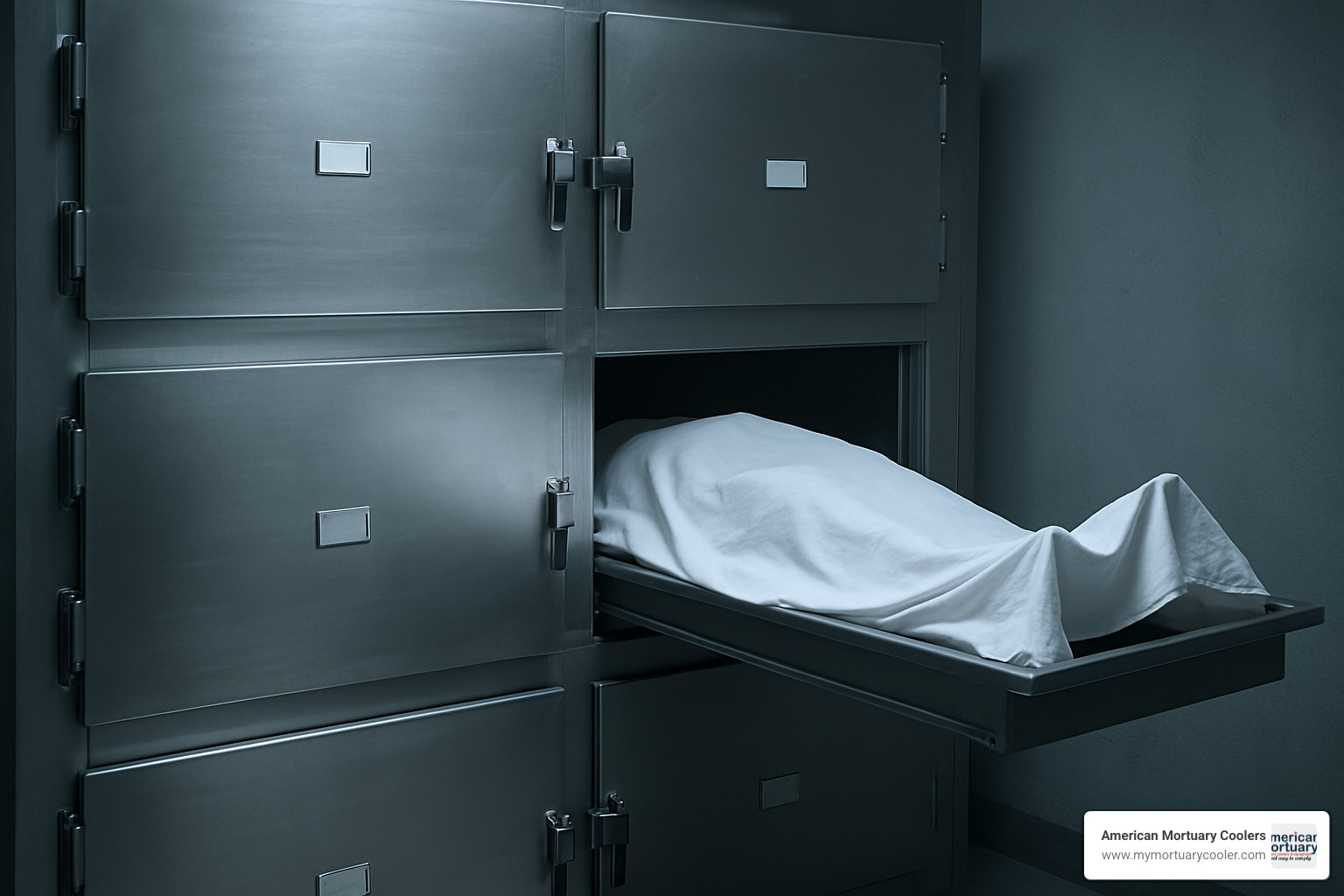
Recent Innovations
Internet-connected monitoring systems now allow funeral directors to check temperatures remotely via smartphone apps – meaning you can verify proper operation even when away from the facility.
Environmental consciousness has entered the industry with solar-ready condensers that can significantly reduce energy costs and carbon footprints. Many newer models use low-GWP refrigerants that are kinder to the environment while maintaining excellent cooling performance.
Smart alarm systems can predict potential failures before they happen, allowing for preventive maintenance rather than emergency repairs.
For disaster response or temporary needs, portable pop-up coolers provide rapidly deployable solutions. And for facilities watching utility bills, energy-recovery systems can capture waste heat from refrigeration units to supplement building heating or hot water.
You can explore various morgue freezer suppliers to compare features, though we're confident our American-made quality stands out in the marketplace.
Trending Technologies in 2024
Remote app alerts have become more sophisticated, with customizable notification systems that alert different staff members based on the type and severity of issues. Variable-speed compressors are now standard in premium models, adjusting cooling capacity based on actual need – cutting energy usage by 25-30% in typical applications.
New antimicrobial coatings on interior surfaces significantly reduce bacterial growth, enhancing both safety and odor control. AI-powered predictive maintenance systems analyze performance data to identify potential issues before they cause failures.
Touchscreen interfaces have replaced complicated control panels, making operation intuitive even for less technical staff members. Cloud-based record keeping has automated temperature logging and compliance reporting.
At American Mortuary Coolers, we carefully evaluate each new technology to determine which innovations truly add value for our customers.
Frequently Asked Questions about Body Storage Refrigerators
How long can a body remain in a body storage refrigerator?
In standard refrigeration (1-5°C), you can typically preserve remains in viewable condition for 3-14 days. This gives families enough time to gather and make arrangements without rushing through their grief. If you need longer preservation, negative temperature units (-10°C to -20°C) can maintain remains for weeks or even months, though these are more commonly used in medical examiner offices.
Individual factors like the person's age, condition at time of death, and pre-existing conditions all play a role in how well preservation works. Environmental factors within your cooler, especially humidity levels and temperature stability, also significantly impact preservation quality.
For most funeral homes handling typical services, our positive temperature refrigeration provides ample time for family gathering and service planning.
What temperature should I set for short-term vs. long-term storage?
For short-term storage (1-7 days), which covers most funeral home needs, setting your unit between 2-4°C (35.6-39.2°F) strikes the perfect balance. This range slows decomposition while maintaining the body in viewable condition for services.
If you anticipate medium-term storage (1-3 weeks), dropping slightly to 1-2°C (33.8-35.6°F) further slows biological processes without freezing tissues.
For those rare situations requiring long-term storage (3+ weeks), switching to a negative temperature unit at -10°C to -20°C (14°F to -4°F) nearly halts decomposition entirely, though it may affect tissue appearance and viewability.
We typically recommend maintaining positive temperature units at 2°C (35.6°F) for most funeral homes. This setting optimizes preservation while keeping energy consumption reasonable.
Do I need a backup generator or UPS system?
Power protection isn't optional when you're responsible for preserving remains. A single extended power outage without backup systems can have devastating consequences.
Every facility housing a body storage refrigerator should have some form of backup power plan. If you're in a rural area prone to power outages, investing in an automatic backup generator provides essential peace of mind. For critical operations like medical examiner offices or large funeral homes, generator systems with automatic transfer switches are practically mandatory.
Smaller operations might start with temperature alarm systems that provide mobile notifications, giving staff time to implement emergency protocols. UPS (uninterruptible power supply) systems offer short-term bridging power until generators activate or utility power returns.
It's not just about preserving remains—it's about preserving trust. Families expect their loved ones to receive dignified care in your facility, regardless of what might happen with the power grid.
Conclusion
Choosing the perfect body storage refrigerator isn't just about equipment—it's about honoring the deceased while supporting families during their most difficult moments. At American Mortuary Coolers, we understand this delicate balance between technical excellence and compassionate service.
Our custom-built solutions are designed specifically for your facility's unique needs. We deliver these durable solutions directly to funeral homes, hospitals, and medical examiner offices across all 48 contiguous states from our Tennessee headquarters.
When selecting your next body storage refrigerator, remember these essential considerations:
Assess your capacity requirements—both current caseload and future growth. Consider space constraints; the perfect cooler fits seamlessly into your workspace. Don't overlook energy efficiency features, which might cost more upfront but reduce monthly operating expenses over time.
The right temperature range makes all the difference in preservation quality. Quality stainless steel construction and proper insulation ensure your investment will serve your facility for years. Proper installation with adequate ventilation and electrical capacity isn't just about performance—it's about safety. Regular maintenance keeps your equipment running smoothly when you need it most.
Proper body preservation gives families the precious time they need while maintaining essential public health standards. It's work that matters, and we're honored to support funeral professionals through reliable, thoughtfully designed refrigeration systems.
For personalized guidance on finding the perfect refrigeration solution for your facility, our team of specialists is ready to help. With locations across the country in Johnson City TN, Atlanta GA, Chicago IL, and beyond, we're never far away when you need expert advice or service.
At American Mortuary Coolers, we don't just build refrigeration equipment—we build peace of mind for you and the families you serve.


















